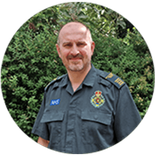Jonathan's Journey - Community Response Manager

Jonathan Needle is one of our community response managers. He has been with the Trust for 30 years.
My first job after leaving school was as a lifeguard at a local swimming pool. Whilst I was there, I received first aid training as part of my role which sparked an interest in first aid and resuscitation.
In January of 1993, I was sent to the ambulance training college in Chippenham, Wiltshire where I received my two-week emergency driver training and six weeks ambulance aid training. Following this, I began my career as an ambulance technician at, what was then known as, Suffolk Ambulance Service. In 1995, I went to Hellesdon to do my paramedic training.
I then worked as a paramedic relief in East Suffolk until 2000 when I finally manged to get a working line at Felixstowe ambulance station where I remained until in 2003, I became the first community first response manager in the country. Over the last 20 years, Ive had various secondments - including duty operations manager, duty tactical commander and silver on call (operations) - before returning to my current role as a community response manager.
I became community response manager as I had become aware of the lack of basic life support (BSL) for cardiac arrest patients prior to our arrival. This prompted me to start training in the community with Heartstart a British Heart Foundation initiative. This eventually led to my involvement with training some of the first community first responders (CFRs) in the Suffolk area. I have tried other roles as mentioned above, but my calling seems to be centred around community education, early access to BLS and automated external defibrillators (AEDs).
Working within EEAST, we have a unique and privileged position in the community, which can offer many opportunities not otherwise possible. Over the years I have been part of major incidents from flooding to WW2 bombs washed up on Felixstowe Beach! My other roles have allowed me to be part of the national development of defibrillators in local communities (national Defib programme 2005), expanding education in basic life support for the public.
Every day here provides a new challenge or opportunity. There is a huge amount of variety in the ambulance service. For anyone considering a role within the Trust, I would say work hard, keep your eyes and ears open, and learn from everyone.
